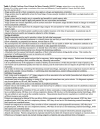Qualitative Analysis of Surveyed Emergency Responders and the Identified Factors That Affect First Stage of Primary Triage Decision-Making of Mass Casualty Incidents
- PMID: 27651979
- PMCID: PMC5016230
- DOI: 10.1371/currents.dis.d69dafcfb3ad8be88b3e655bd38fba84
Qualitative Analysis of Surveyed Emergency Responders and the Identified Factors That Affect First Stage of Primary Triage Decision-Making of Mass Casualty Incidents
Abstract
Introduction: After all large-scale disasters multiple papers are published describing the shortcomings of the triage methods utilized. This paper uses medical provider input to help describe attributes and patient characteristics that impact triage decisions.
Methods: A survey distributed electronically to medical providers with and without disaster experience. Questions asked included what disaster experiences they had, and to rank six attributes in order of importance regarding triage.
Results: 403 unique completed surveys were analyzed. 92% practiced a structural triage approach with the rest reporting they used "gestalt".(gut feeling) Twelve per cent were identified as having placed patients in an expectant category during triage. Respiratory status, ability to speak, perfusion/pulse were all ranked in the top three. Gut feeling regardless of statistical analysis was fourth. Supplies were ranked in the top four when analyzed for those who had placed patients in the expectant category.
Conclusion: Primary triage decisions in a mass casualty scenario are multifactorial and encompass patient mobility, life saving interventions, situational instincts, and logistics.
Keywords: Disaster medicine; Emergency management; Mass casualty care; Triage.
Figures






Similar articles
-
First Responder Accuracy Using SALT during Mass-casualty Incident Simulation.Prehosp Disaster Med. 2016 Apr;31(2):150-4. doi: 10.1017/S1049023X16000091. Epub 2016 Feb 9. Prehosp Disaster Med. 2016. PMID: 26857296
-
Attitudes Towards and Experience of the Use of Triage Tags in Major Incidents: A Mixed Method Study.Prehosp Disaster Med. 2016 Aug;31(4):376-85. doi: 10.1017/S1049023X16000480. Epub 2016 May 23. Prehosp Disaster Med. 2016. PMID: 27212424
-
Triage performance of first-year medical students using a multiple-casualty scenario, paper exercise.Prehosp Disaster Med. 2010 May-Jun;25(3):239-45. doi: 10.1017/s1049023x00008104. Prehosp Disaster Med. 2010. PMID: 20586018
-
Unstable ethical plateaus and disaster triage.Emerg Med Clin North Am. 2006 Aug;24(3):749-68. doi: 10.1016/j.emc.2006.05.016. Emerg Med Clin North Am. 2006. PMID: 16877141 Review.
-
Triage in Complex, Coordinated Terrorist Attacks.Prehosp Disaster Med. 2019 Aug;34(4):442-448. doi: 10.1017/S1049023X1900459X. Prehosp Disaster Med. 2019. PMID: 31389325 Review.
Cited by
-
When do caregivers ignore the veil of ignorance? An empirical study on medical triage decision-making.Med Health Care Philos. 2021 Jun;24(2):213-225. doi: 10.1007/s11019-020-09992-x. Epub 2021 Jan 4. Med Health Care Philos. 2021. PMID: 33398490 Free PMC article.
-
Triage.Crit Care Clin. 2019 Oct;35(4):575-589. doi: 10.1016/j.ccc.2019.06.009. Epub 2019 Jul 27. Crit Care Clin. 2019. PMID: 31445606 Free PMC article. Review.
References
-
- World Health Organization. Mass casualty management systems: Strategies and guidelines for building health sector capacity. WHO, 2007. Available at: http://www.who.int/hac/techguidance/MCM_guidelines_inside_final.pdf. Accessed 1 April 2016.
-
- Institute of Medicine (IOM). 2009. Guidance for establishing crisis standards of care for use in disaster situations: a letter report. Washington, DC: The National Academies Press. Available at: http://www.nationalacademies.org/hmd/Reports/2009/DisasterCareStandards..... Accessed 1 April 2016. - PubMed
-
- FICEMS Report: National Implementation of the Model Uniform Core Criteria for Mass Casualty Incident Triage. A Report of the FICEMS (Federal Interagency Committee on Emergency Medical Services). July 13, 2013. Available at: ems.gov/pdf/2013/ficems_meet/07-FICEMS_MUCC_Implementation_Plan.pdf. Accessed on 22 January 2014.
-
- McDonald L, Butterworth T, Yates DW. Triage: a literature review 1985-1993. Accid Emerg Nurs. 1995;3:201-207 - PubMed
-
- Garrouste-Orgeas M, Montuclard L, Timsit JF, et al. Triaging patients to the ICU: a pilot study of factors influencing admission decisions and patient outcomes. Intensive Care Med. 2003;29: 774-781 - PubMed
LinkOut - more resources
Full Text Sources
Other Literature Sources

